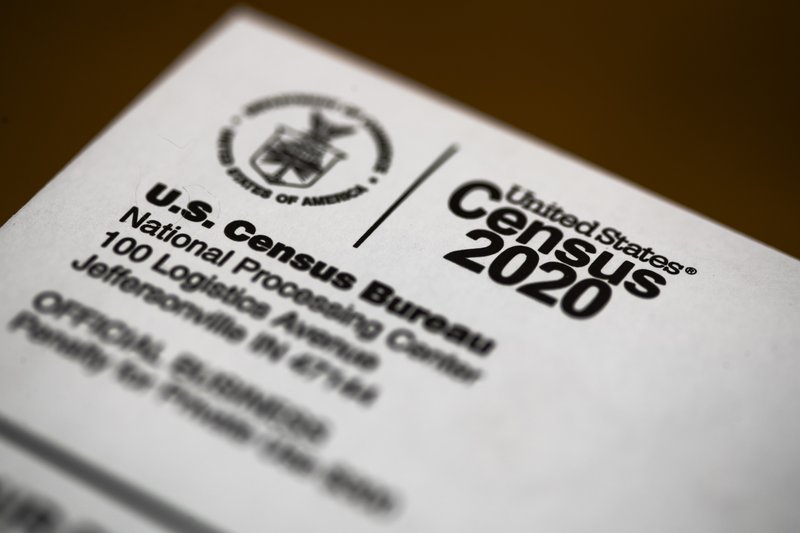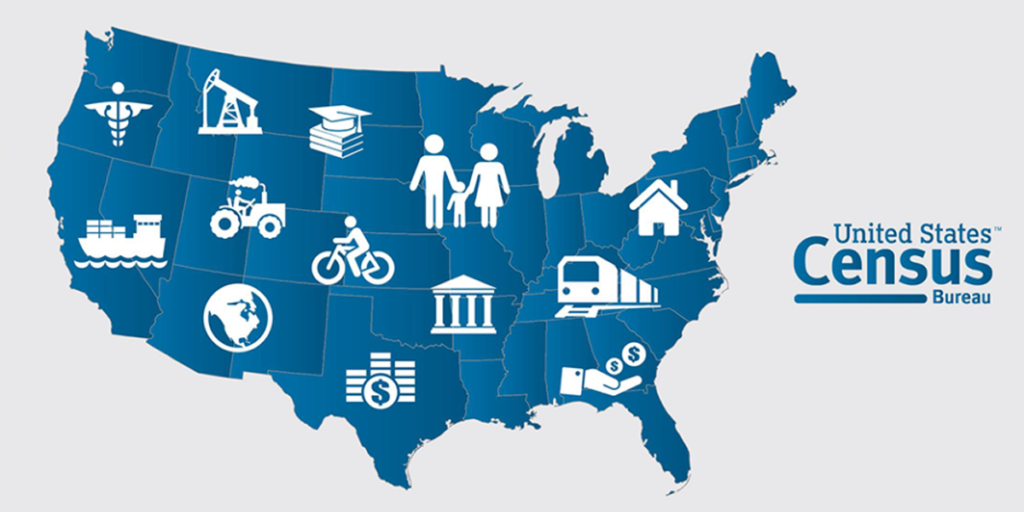16 states back Alabama’s challenge to Census privacy tool

Sixteen other states are backing Alabama’s challenge to a statistical method the U.S. Census Bureau is using for the first time to protect the privacy of people who participated in the 2020 census, the nation’s once-a-decade head count that determines political power and funding. A federal judge on Monday allowed the 16 states to file a brief in a support of a lawsuit brought by Alabama last month. The suit seeks to stop the Census Bureau from applying the method known as “differential privacy” to the numbers that will be used for redrawing congressional and legislative seats later this year. The states supporting Alabama’s challenge are Alaska, Arkansas, Florida, Kentucky, Louisiana, Maine, Mississippi, Montana, Nebraska, New Mexico, Ohio, Oklahoma, South Carolina, Texas, Utah and West Virginia. Maine and New Mexico have Democratic attorneys general, while all the other states have Republican ones. A three-judge panel in federal court in Alabama is hearing the case, which could go directly to the Supreme Court if appealed. Differential privacy adds mathematical “noise,” or intentional errors, to the data to obscure any given individual’s identity while still providing statistically valid information. Bureau officials say the change is needed to prevent data miners from matching individuals to confidential details that have been rendered anonymous in the massive data release, which is expected as early as August. It will be applied to race, age and other demographic information in geographic areas within each state. “It’s a statistical technique that is intended to protect people’s privacy … There can be privacy hacks today that technologically weren’t possible 10 years ago,” said Department of Commerce Secretary Gina Raimondo last week during a White House briefing. “So in order for us to keep up with that and protect people’s privacy, we have to implement new techniques, and this is one of those new techniques.” The Commerce Department oversees the Census Bureau. The 16 states supporting Alabama said that differential privacy’s use in the redistricting numbers will make the figures inaccurate for all states, especially at small geographic levels, and the Census Bureau could use other methods to protect people’s privacy. Differential privacy “would make accurate redistricting at the local level impossible,” violating the constitutional obligation that districts have equal populations, and it also could harm long-running research on health and safety, their brief said. “Because differential privacy creates false information — by design — it prevents the states from accessing municipal-level information crucial to performing this essential government functions,” the 16 states said. “And the distorting impact of differential privacy will likely fall hardest on some of the most vulnerable populations — rural areas and minority racial groups.” A pair of civil rights groups also raised concerns, saying an examination of test Census data showed differential privacy produced numbers that were less accurate for determining if a racial or ethnic minority group formed a majority in a particular community, potentially diluting their local political power. Democratic-led lawmakers in California, the nation’s largest state, also raised concerns about differential privacy in a recent letter to President Joe Biden’s chief of staff, Ronald Klain. The Alabama lawsuit also challenges the Census Bureau’s decision to push back the release of redistricting data from March 31 to August at the earliest. The statistical agency says the changed deadline was needed because of delays caused by the pandemic, and it had to prioritize the processing of figures used for divvying up congressional seats among the states. That data set is going to be released later this month. Twenty-seven states are required to finish redistricting this year. The delay has sent states scrambling for alternative plans such as using other data, utilizing previous maps, rewriting laws dealing with the deadlines or asking courts to extend deadlines. The state of Ohio filed a similar lawsuit over the changed deadlines. A federal judge dismissed the case, but Ohio has appealed. In a response to the appeal, the Census Bureau said Monday that Ohio was seeking the redistricting data “without regard to the Bureau’s own views of its completeness and accuracy.” “The Bureau recognizes the states’ interest in receiving redistricting data, but Ohio does not explain how the public interest would be served by foreshortening the Bureau’s work to produce less accurate, complete, or usable data at an earlier date,” the agency said in court papers. Republished with the permission of the Associated Press.’
Kay Ivey kicks off 2020 Census

Governor Kay Ivey kicked off the 2020 census today with Alabama Counts! Chairman Kenneth Boswell, Senate Pro Tempore Del Marsh, House Speaker Mac McCutcheon, State Sen. Bobby Singleton, and Marilyn Stephens of the Census Bureau’s Atlanta Region Research. For the first time in the nations history, the Census is now live online at my2020Census.gov. Additionally, invitation letters have begun and will continue to arrive across the state through March 20. Alabamians can participate in the 10-question Census online, by phone or via traditional paper form. All participants’ information is protected by strict federal law. Ivey said, “Since I took office in 2017, it has been a priority to ensure Alabama is accurately counted in the census because of the significant impacts on our state in areas of congressional representation and critical federal funding. Whether you are filling out your census online at my2020Census.gov, answering by phone or on the traditional paper form, I urge everyone to be counted! The future of our state depends on Alabamians taking just a few minutes to participate in the 2020 Census.” According to the governors office, “Speakers reiterated what the state stands to lose if Alabama’s count fails to reach a maximum level and falls shy of the 72 percent participation rate in the 2010 Census. Potential low-participation effects including the loss of millions of dollars in Census-derived community funding, loss of potential economic development opportunities, and reduced state representation in Congress.” Chairman Boswell added he and 2020 Census Committee Members statewide encourage participation as soon as invitation letters are received and by April 30; however, there will be a second push for participation in the months following for those Alabamians who have yet to engage. “The impact of this census will be felt for 10 years, so it is imperative that we all do our part and participate for our children, grandchildren, communities and schools,” said Boswell, who is director of the Alabama Department of Economic and Community Affairs. “We are counting on all Alabamians to participate in the 2020 Census.” “The census asks very basic demographic information and only takes about six minutes to complete, so we encourage everyone living or staying in Alabama to complete the census as soon as you receive your invitation from the Census Bureau,” Boswell said. “By filling it out as soon as possible, you can fulfill your civic duty and help our state.” Additional information on Census 2020, Alabama-specific statistic, local community resources and Alabama Counts! campaign assets can be found at census.Alabama.Gov.
Alabama, Mo Brooks sue over inclusion of illegal aliens in US Census

Alabama 5th District U.S. Rep. Mo Brooks and Alabama Attorney General Steve Marshall have filed a lawsuit against the federal government over what they said was the Census Bureau‘s “unlawful” decision to include of illegal immigrants in census data “used to determine the apportionment of the U.S. House of Representatives and the Electoral College.” Marshall says the move will cause Alabama to lose a seat in the U.S. House of Representative as well as a vote in the Electoral College. “If the U.S. Census Bureau follows through with its plan to include illegal aliens in the 2020 census for purposes of apportionment, Alabama will lose both a seat in the U.S. House of Representative and a vote in the Electoral College,” explained Marshall. “Alabama’s loss will be another state’s gain, as states with a growing illegal alien population will be the beneficiary of this reapportionment. I have joined with Congressman Mo Brooks in filing suit against the federal government to stop the inclusion of illegal aliens in the census’s apportionment population. The Constitution does not permit the dilution of our legal residents’ right to equal representation in this manner.” Brooks echoed Marshall’s thoughts. “Each decade, 435 Congressional seats are apportioned among the states based on population. Congressional seats should be apportioned based on the population of American citizens, not illegal aliens. After all, this is America, not the United Nations,” said Brooks. Brooks says there are roughly fifteen million illegal aliens in America (no one knows for sure the exact number), which would mean roughly 20 Congressional seats would be taken from low-illegal alien population states and given to high-illegal alien population states like California. “As of today, Alabama likely loses a Congressional seat after the 2020 census if apportionment includes illegal alien counts. The loss of an Alabama Congressional seat will be a huge loss in Alabama’s political influence and will diminish Alabama’s influence in Congress and its importance in presidential elections,” Brooks continued. “This lawsuit will have significant and enduring effects on Alabama and other states harmed by unconstitutional census methods. Fundamentally, the issue is fair and equal representation for United States citizens. While some stand for illegal aliens, I stand for American citizens.” In their lawsuit, Marshall and Brooks argue the Census Bureau’s “Residence Rule” — which allows foreign nationals living in the United States to be counted in the census and allocated to the state of their “usual residence” regardless of whether they are legally present in the U.S. — violates the Fourteenth Amendment of the U.S. Constitution and the constitutional principal of equal representation: “The Residence Rule breaches the federal government’s constitutional obligation to conduct an ‘actual Enumeration’ of the number of ‘persons in each State.’ The phrase ‘persons in each State’ was understood at both the Founding and in the Reconstruction era to be restricted to aliens who have been lawfully admitted to the body politic constituted by the Constitution. Aliens who are unlawfully present in the United States did not qualify because they are not entitled to political representation. Thus, the actual enumeration of the population cannot include such aliens.” Alabama is not alone in being adversely affected by the Census Bureau’s decision to include illegal aliens in the apportionment calculation. Ohio is likely to lose a congressional seat and an electoral vote, and Montana will not gain a congressional seat and an electoral vote it would have acquired if illegal aliens were excluded from the 2020 census and the apportionment base. The State of Alabama’s lawsuit against the U.S. Department of Commerce and the Census Bureau was filed May 21, 2018, in the U.S. District Court for the Northern District of Alabama. Click HERE to view the lawsuit. Watch Brooks’ House floor speech making the announcement below:
Taylor Dawson: Is the American Dream alive and well in Alabama?

A recent Pew Research study found that over 80% of U.S. citizens believe they’ve achieved the American dream, or at least that they’re on the way to doing so. Only 17% of those surveyed said the American dream is “out of reach” for their family. But what about Alabamians? This high level of satisfaction seems like it might not translate in a relatively poor state like ours. U.S. Census data from 2016 indicates that 17.1% of Alabamians live below the poverty line. Based on that, one could reasonably conclude that because the percentage of those living below the poverty line in Alabama almost matches the percentage of those who believe the American dream is out of reach, affluence—or at least living above the poverty line—is the key to the American dream. But it may not be that simple. As the Pew study revealed, 89% of Americans (and Alabamians are likely no exception) agree that wealth is not central to achieving the American dream. There are two big values, however, that were found to be key to its attainment: enjoying fundamental freedoms and having a strong family life. The Pew research found that a whopping 77% agree that the American dream is tied to “freedom of choice in how to live”, and 70% say having “a good family life” is essential to living the dream. Freedom of religion and freedom of expression, including the freedom of speech and press, are protected by the First Amendment. Their preservation simply requires that the government and fellow citizens allow a person to exercise their faith and speak their mind as they see fit. While the freedoms of religion and speech are paramount, other liberties are also essential to the American dream. A large majority of Alabamians embrace the right of a parent to teach their children as they see fit, the principle of free enterprise to engage in business without overregulation and taxation from the government, and the right of a gun-owner to legally purchase and carry a firearm without being treated like a criminal. Needless to say, the survey’s second most agreed-upon basis for achieving the American dream—having a good family life—is far more personal than the protection of various liberties, but no less important. That’s likely the response of those surveyed because they inherently know what research statistically demonstrates. According to Dr. Pat Fagan of the Family Research Council, adults in intact families are statistically more economically productive, and children from broken families learn less, achieve less academically, and drop out of formal education earlier. While financial freedom can certainly make life easier, the ageless adage that money can’t buy happiness seems to hold sway in the minds of most Americans, as it certainly must in the minds of most Alabamians. When it’s all said and done, affluence takes a back seat to the love and security of family in every estimation, and that reaches far beyond the traditional notion of the American dream. ••• Taylor Dawson is Director of Communications for the Alabama Policy Institute (API). API is an independent, nonpartisan, nonprofit research and educational organization dedicated to strengthening free enterprise, defending limited government, and championing strong families. If you would like to speak with the author, please e-mail communications@alabamapolicy.org or call (205) 870-9900.
Alabama at risk of losing a seat in Congress after 2020 census

Speculation has officially begun — Alabama is could lose one of its seven U.S. House seats after the 2020 U.S. Census, according to projections. This could happen as the results of the census are used to divide 435 congressional seats and $675 billion in federal government funding a year. Over the past seven years, Alabama’s growth has slowed while the U.S. population has risen. If everyone in the state isn’t accounted for, Alabama could lose one of its seats. What a lost seat means for Alabama While the census is still three years away, political leaders across the state are starting to worry about what that the loss of a seat would mean for the Yellowhammer State. “Alabama is in jeopardy of losing a congressperson,” Governor Kay Ivey told the Association of County Commissions of Alabama in August. “But more devastating than that could be the fact that we will lose federal funding.” Ivey is referring to the more than $7.5 billion in federal funding the state receives each year. Executive Director of the Arise Citizens’ Policy Project (ACPP), Kimble Forrister, agrees. The loss of federal funding could have devastating effects on the state. “Alabama can’t afford to be undercounted in the upcoming Census,” said Forrister. “Investments in Medicaid, housing and transportation make Alabama a better place to live and work, and we need to ensure our state doesn’t get shortchanged on the federal funding that helps make those services possible.” Losing a seat would also effect the state’s sway in the Electoral College during Presidential Elections considering the fact electors are tied to the number of representatives in Congress. The history of Alabama’s House seats It’s been nearly half a century, since 1973, since the Yellowhammer State last lost a congressional seat, and well over a century, 144 years dating back to 1873, since it had fewer than seven representatives in the U.S. House of Representatives. But despite strong population growth between 2000 and 20100, the state’s growth has slowed the past seven years, putting a House seat in jeopardy. Here’s the history of Alabama’s House seats: 1818 – 1819: 1 non-voting delegate 1819 – 1823: 1 seat 1823 – 1833: 3 seats 1833 – 1843: 5 seats 1843 – 1863: 7 seats 1863 – 1873: 6 seats 1873 – 1893: 8 seats 1893 – 1913: 9 seats 1913 – 1933: 10 seats 1933 – 1963: 9 seats 1963 – 1973: 8 seats 1973 – present: 7 seats How Alabama reapportions a lost seat Should Alabama lose a House seat, the state legislature would redraw the districts, as a regular statute, subject to gubernatorial veto by Ivey. In 2011, Alabama’s legislative redistricting committee adopted guidelines to help streamline the process. The determined districts should be contiguous, reasonably compact, follow county lines where possible, and maintain communities of interest to the extent feasible; the committee further noted it would attempt to avoid contests between incumbents wherever possible. All meetings of the reapportionment committee and its subcommittees will be open to the public and all plans presented at committee meetings will be made available to the public As state lawmakers discuss possible redrawn maps, citizens will be also allowed to submit their own redistricting plans, using ESRI redistricting software. All meetings of the reapportionment committee and its subcommittees will be open to the public and all plans presented at committee meetings will be made available to the public. 2020 census deemed “high risk” The 2020 Census has already been listed by the Government Accountability Office (GAO) as a “high risk” federal program. “The bureau has not addressed several security risks and challenges to secure its systems and data, including making certain that security assessments are completed in a timely manner and that risks are at an acceptable level,” Eugene Dodaro, the US Comptroller General, said in a statement during a US Senate hearing last week. Dodaro explained in order to save money, the 2020 census plans to heavily rely on technology, rather than canvassing and responses by mail. As part of this plan the GAO has identified 43 electronic systems that will be used in the 2020 census. According to Dodaro none of the systems have undergone the required security certification – and one, the code used to tabulate all the data, won’t even finish development until March 2019 at best. Which is precisely why Ivey is pushing for local help come census time. “I’m dead serious about this, folks. We need your help,” Ivey said in August reiterating the need of local involvement to ensure every state resident gets counted for in the census. Her insistence is due to the fact that the difference between the state keeping or losing one of its House seats could come down to fewer than a thousand people, just as it did in Utah following the 2010 census. 2020 reapportionment prediction map [Photo Credit: Election Data Services]

